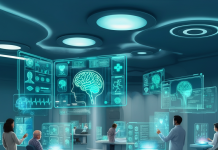Aging is inevitable, and it is essential to prepare yourself for the changes and health problems that come with it. Many people often associate aging with the loss of energy, a decline in physical capabilities, and health problems. However, you don’t have to give in to these problems. Many common health issues come with age, but the good news is that they are treatable. In this post, we will explore the five most common health issues that come with age and provide you with tips on how to treat them.
Arthritis
Arthritis is a common condition that affects many people as they age. It is a joint disorder that causes inflammation in the joints, leading to stiffness and pain. However, with the right treatment, you can manage the symptoms and continue to live an active life.
There is no cure for arthritis, but various treatments can help manage the symptoms. You may be prescribed nonsteroidal anti-inflammatory drugs (NSAIDs) to reduce pain and inflammation. Physical therapy can also help improve joint function and mobility. In severe cases, surgery may be recommended to replace the damaged joint. Additionally, lifestyle changes such as maintaining a healthy weight, staying physically active, and eating an anti-inflammatory diet can also help manage arthritis symptoms.
Diabetes
Diabetes is another common health issue that comes with age. It is a chronic disease that affects how your body processes blood sugar. Fortunately, with lifestyle changes and proper management, you can keep your blood sugar levels under control. Treatment options include diet and exercise, medication, and insulin therapy. Speak with your doctor to create a treatment plan that suits your unique needs.
If you are diagnosed with diabetes, it is normal to feel overwhelmed and anxious. However, it is essential not to panic and instead focus on creating a treatment plan with your doctor. Diabetes can be effectively managed through lifestyle changes, medication, and regular check-ups. With the right support and resources, you can lead a fulfilling life while managing your diabetes.
Dietary and Digestive Problems
As we age, our digestive system may slow down, leading to dietary and digestive problems. These can include constipation, acid reflux, fecal incontinence, and difficulty absorbing nutrients from food. To manage these issues, it’s essential to maintain a healthy diet with plenty of fiber and stay hydrated. Speak with your doctor about any vitamins or supplements you may need to support your digestive health.
In addition to a healthy diet, making dietary changes can also help manage digestive problems. This may include avoiding trigger foods that cause discomfort, eating smaller meals throughout the day instead of large ones, and limiting alcohol and caffeine intake. Keeping a food diary can also help identify which foods may be causing issues so you can avoid them in the future. If dietary changes alone are not enough, your doctor may recommend medication or other treatments to manage digestive issues.
Cognitive Decline
As we age, it is common to experience some degree of cognitive decline. This can include memory loss, difficulty with problem-solving and decision-making, and changes in mood and behavior. While this may be a natural part of aging, there are ways to slow down the progression of cognitive decline. Engaging in mentally stimulating activities, such as puzzles and games, staying physically active, and maintaining social connections can all help keep your mind sharp.
Additionally, a healthy diet rich in brain-boosting nutrients like omega-3 fatty acids and antioxidants can also support brain health. And if you notice significant changes or concerns about cognitive decline, don’t hesitate to speak with your doctor for further evaluation and potential treatment options.
High Blood Pressure
As you age, it’s important to monitor your blood pressure levels regularly. High blood pressure can lead to serious health problems, including stroke and heart attack. While medication is an option for treating high blood pressure, it is essential to make lifestyle changes as well. These include maintaining a healthy weight, exercising regularly, eating a healthy diet, reducing sodium intake, and quitting smoking.
Symptoms of high blood pressure may not be noticeable at first, which is why it is often referred to as the “silent killer.” However, some common symptoms include headaches, dizziness, chest pain, and shortness of breath. If you experience any of these symptoms or have a family history of high blood pressure, it is essential to speak with your doctor and get your blood pressure checked regularly.
Vision Problems
As you age, it’s common to experience changes in your vision. These can include difficulty seeing at night, reduced vision, and eye diseases such as cataracts and glaucoma. Fortunately, regular eye exams can detect these problems early, giving you the best chance of successful treatment. Treatment options include corrective eyewear, medication, and surgery.
To ensure that you receive the best care for your vision, it is essential to find a reputable and experienced eye doctor. Start by asking for recommendations from family and friends or your primary care physician. You can also research online to read reviews and learn about their qualifications and specialties.
Once you have a few options, schedule consultations with each doctor to determine who will be the best fit for your needs. Remember to ask about their experience, treatment options, and communication style during the consultation. A great eye doctor will listen to your concerns, explain procedures clearly, and make you feel comfortable throughout your visits.
Aging comes with its share of health problems, but many of them are treatable. It’s important to stay proactive about your health and speak with your doctor about any concerns you may have. With the right treatment, you can manage these health issues and continue to live an active and healthy life. Remember to stay active, eat a healthy diet, and maintain a positive attitude towards aging.














